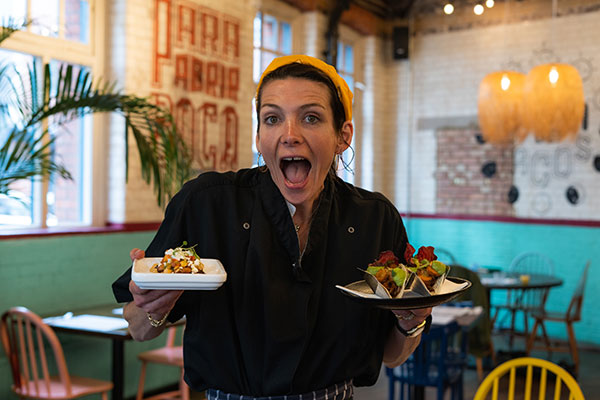Thomasina Miers is the co-founder of Mexican restaurant chain Wahaca, and known for her efforts and campaigning around sustainability. Her group of restaurants is now carbon neutral, and she works with the Sustainable Restaurant Association and the Soil Association to campaign for a more sustainable food system.
How has Covid affected sustainable restaurants, from your perspective?
Thomasina Miers (TM): I think some people have definitely started thinking more about where their food comes from. And the link between healthy diets and ability to fight off disease has been firmly proven. Unfortunately, the economic impact of the virus on many lives, particularly the poorest ones, has been well documented and I think when people are hungry, the quality of what they eat can fly out of the window.
There was a concerted effort by the industry on not wasting plastic but Covid precautions has seen backward progress here. However, on a positive note customers are really looking for authentic voices in our industry and they are now willing to ask the right questions about where their food has come from and stories about good animal welfare practices and local suppliers are important to people.
Why do you think lockdown has prompted more people to consider sustainable food when eating out?
TM: People spent months at home, appreciating more than before the value of food and its provenance; I believe people want to see their favourite restaurants sharing those values.

How can people look out for sustainable food in restaurants? Are there certain things to look out for, or questions that can be asked, in your view?
TM: I think customers know some fairly standard measures of checking a restaurant’s efforts to do the right thing, whether it’s showing participation in schemes like Marine Stewardship Council or the Soil Association, whether the website champions suppliers, what the tipping policy is etc. Front of house should be happy to engage on any of these questions and speak happily and informatively about them.
Do you think there should be more labelling of food on menus to help consumers make informed choices?
TM: I think restaurants can talk in an engaging way about where their food comes from, about their suppliers and interesting varieties of vegetables without lecturing anyone. It is about exciting the customer, not hectoring them.
What is your view of schemes like the Soil Association’s Food for Life?
TM: I am an ambassador of the Soil Association and am fully supportive of all their schemes. They are really trying to make all of us citizens think more about where our food comes from and its impact on the environment as well as what good food does to our health (as opposed to poor food). The link between industrially processed food, poor human health and poor soil health is all too established.
What kind of suppliers do you choose to work with at Wahaca? And how do you communicate that to diners?
TM: We work with Riverford Organic because they are looking after the soil, with small niche suppliers like Blanco Nino and Trealy Farm, who really care about their product and with amazing British farmers who practise good free-range animal husbandry.

How did Wahaca work with its sustainable suppliers over the pandemic to reduce waste and avoid loss of incomes?
TM: We made sure that our suppliers were all paid – that was a priority as without them, we are nothing.
Do you have any views on how procurement in the wider restaurant and hospitality sector could be transformed to be more sustainable? What would help this, in your view?
TM: Sourcing and serving less meat and dairy are the most significant ways the whole sector can increase its sustainability. Our street food menu is about 50 per cent veg-led. When sourcing from overseas we endeavour to trade directly or as close to directly as possible with the producers
How worried are you about the effect of trade deals and lower quality food imports entering the UK food and restaurant sectors?
TM: When the Agriculture Bill was going through Parliament there was still hope that our high standards of animal welfare and production would become enshrined in law. Without that protection, there has to be a concern that potentially cheaper meat and other produce will come onto the UK market and be served in some restaurants, crucially without customers necessarily knowing what they are eating.










0 Comments